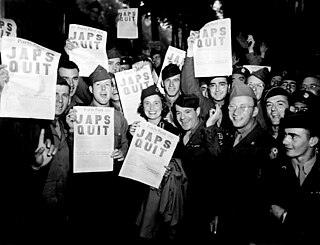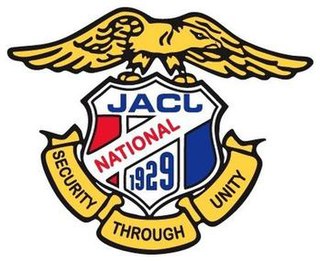Related Research Articles

The foreign relations of Japan are handled by the Ministry of Foreign Affairs of Japan.

Jap is an English abbreviation of the word "Japanese". Today, it is generally regarded as an ethnic slur among Japanese minority populations in other countries, although English-speaking countries differ in the degree to which they consider the term offensive. In the United States, Japanese Americans have come to find the term very controversial or extremely offensive, even when used as an abbreviation, after the events of the internment of Japanese Americans. In the past, Jap was not considered primarily offensive; however, following the Attack on Pearl Harbor and the Japanese declaration of war on the United States, the term became derogatory. Nisei veterans who served in World War II were shunned with signs that read "No Japs Allowed" and "No Japs Wanted", denied service in shops and restaurants, and had their homes and property vandalized.

Mamoru Shigemitsu was a Japanese diplomat and politician in the Empire of Japan, who served as the Japanese Minister of Foreign Affairs at the end of World War II and later, as the Deputy Prime Minister of Japan.

Aizu (会津) is the westernmost of the three regions of Fukushima Prefecture, Japan, the other two regions being Nakadōri in the central area of the prefecture and Hamadōri in the east. As of October 1, 2010, it had a population of 291,838. The principal city of the area is Aizuwakamatsu.

Katsuo Okazaki was a Japanese sportsman, diplomat and political figure. He served as the Japanese foreign minister in the 1950s. He was also the final – and only Japanese – chairman of the Shanghai Municipal Council.

The Japanese American Citizens League is an Asian American civil rights charity, headquartered in San Francisco, with regional offices across the United States.

Saburō Kurusu was a Japanese career diplomat. He is remembered now as an envoy who tried to negotiate peace and understanding with the United States while the Japanese government under Hideki Tojo was secretly preparing the attack on Pearl Harbor.
The following article focuses on the movement to obtain redress for the internment of Japanese Americans during World War II, and significant court cases that have shaped civil and human rights for Japanese Americans and other minorities. These cases have been the cause and/or catalyst to many changes in United States law. But mainly, they have resulted in adjusting the perception of Asian immigrants in the eyes of the American government.

Murakami Domain was a feudal domain under the Tokugawa shogunate of Edo period Japan, located in Echigo Province, Japan. It was centered on Murakami Castle in what is now the city of Murakami, Niigata.

Ojima Domain, also known as Kojima Domain, was a Japanese domain of the Edo period. It was located in Suruga Province in what is now part of modern-day Shimizu Ward of the city of Shizuoka, Shizuoka Prefecture.
The Pacific Citizen (P.C.) is a national, award-winning semi-monthly newspaper based in Los Angeles, California, United States. The P.C. has been providing the leading Asian Pacific American (APA) news to the community since its inception in 1929. The newspaper is published by the Japanese American Citizens League, JACL, which is the nation’s oldest and largest APA civil rights organization.
In 2002, there were 6,413 people of Japanese origin, including Japanese citizens and Japanese Americans, in the Wayne-Oakland-Macomb tri-county area in Metro Detroit, making them the fifth-largest Asian ethnic group there. In that year, within an area stretching from Sterling Heights to Canton Township in the shape of a crescent, most of the ethnic Japanese lived in the center. In 2002, the largest populations of ethnic Japanese people were located in Novi and West Bloomfield Township. In April 2013, the largest Japanese national population in the State of Michigan was in Novi, with 2,666 Japanese residents. West Bloomfield had the third-largest Japanese population and Farmington Hills had the fourth largest Japanese population.
Kazutami Watanabe was a Japanese scholar and translator of French literature.
The Heart Mountain Fair Play Committee was a group organized in 1943 to protest the draft of Nisei, from Japanese American concentration camps during World War II. Kiyoshi Okamoto formed a "Fair Play Committee of One" in response to the War Relocation Authority's controversial loyalty questionnaire in 1943, and was later joined by Frank Emi and other inmates of the Heart Mountain camp. With seven older leaders at its core, the Committee's membership grew as draft notices began to arrive in camp. To challenge their forced "evacuation" by the government, they refused to volunteer or participate in the draft, but the Committee required its members to be citizens loyal to the United States willing to serve if their rights were restored. By June 1944, several dozen young men had been arrested and charged by the U.S. government with felony draft evasion. While the camp at Poston, Arizona produced the largest group of draft resisters, at 106, the Fair Play Committee was the most prominent inmate organization to protest the draft, and the rate of draft resistance at Heart Mountain was the highest of any camp. The number of resisters eventually numbered nearly 300 from all ten camps.
Hibi Kimei was Governor of Okinawa Prefecture (1908–1913).

Kono Oto Tomare! Sounds of Life is a Japanese manga series written and illustrated by Amyu. The series began publication in Shueisha's Jump Square magazine in August 2012, and has been compiled into 23 tankōbon volumes as of October 2, 2020. It has been reported that over 2.3 million copies of the manga have been sold. An anime television series adaptation by Platinum Vision aired from April to December 2019.

Marquis Yasumasa Matsudaira was a Japanese imperial bureaucrat and university professor.
Tomio Moriguchi is an American businessman and civil rights activist who served as CEO of the Uwajimaya supermarket chain in Seattle, Washington, from 1965 to 2007.
Martin Mitsuyuki "Mich" Matsudaira, also known as Mitch Matsudaira, was an American businessman and civil rights activist.
References
- ↑ Current Biography Yearbook. H. W. Wilson Company. 1958. p. 278.
- ↑ Jinji kōshinroku. 10-ban (Shōwa 9-nen) gekan人事興信録. 10版(昭和9年) 下卷 [HR Directory 10th Edition (1934) Part 2]. National Diet Library (in Japanese). 人事興信所. 1934. p. マ 104. Retrieved 16 May 2020.
- ↑ "Koto Matsudaira". Munzinger (in German). Retrieved 20 July 2018.
- ↑ "List of Successive Japanese Heads of Mission to Canada". Embassy of Japan in Canada. Retrieved 19 July 2018.
- ↑ Bidwell, R.L. (12 November 2012). Guide to Government Ministers: The Major Powers and Western Europe 1900-1071. Routledge. p. 287. ISBN 9781136272813.
- ↑ "Protest envoy acceptance of 'Jap'". Densho. Pacific Citizen. 2 August 1957. Retrieved 19 July 2018.
- ↑ Miyakawa, Wataru (9 July 1957). "Reply to letter regarding use of term "Jap" on a television program". Densho. Retrieved 9 July 2018.
- ↑ "Matsudaira sorry on acceptance of 'Jap'". Densho. Pacific Citizen. 9 August 1957. Retrieved 19 July 2018.
- ↑ "Matsudaira to cooperate in JACL campaign to depopularize 'Jap'". Densho. Pacific Citizen. 16 August 1957. Retrieved 19 July 2018.
- ↑ Cordier, Andrew; Foote, Wilder (1 June 2010). Public Papers of the Secretaries General of the United Nations. 4. Columbia University Press. p. 135. ISBN 9780231513784.
- ↑ "日本の国連外交における三大課題" [Three major issues in Japan's United Nations diplomacy]. Institute for Peace Policies (in Japanese). Retrieved 20 July 2018.
- ↑ "Ambassador Matsudaira in tribute to Issei pioneers, to Nisei; calls for international cooperation between nations for peace". Densho. Pacific Citizen. 8 July 1960. Retrieved 19 July 2018.
- ↑ Ando, Nisuke (27 May 1999). Japan and International Law: Past, Present and Future : International Symposium to Mark the Centennial of the Japanese Association of International Law. Martinus Nijhoff Publishers. p. 32. ISBN 9041111948.
- ↑ The Rotarian. Rotary International. February 1962. p. 48.
- ↑ Kanda, Yutaka (22 November 2019). Japan's Cold War Policy and China: Two Perceptions of Order, 1960–1972. Routledge. p. 83. ISBN 9781351721233.
- ↑ "Myōkei-ji" 妙慶寺. Kanazawa tabi monogatari (in Japanese). Archived from the original on 12 October 2019. Retrieved 7 June 2020.
- ↑ Jinji kōshinroku. Dai 14-ban-ka人事興信録. 第14版 下 [HR Directory 14th Edition Part 2]. National Diet Library (in Japanese). Jinji Kōshinsho. 1943. p. マ 96. Retrieved 15 May 2020.
- ↑ Kaufman, Stuart (14 October 1951). "Tokyo Girl, 7, on Mission to U.S." Newspapers.com. The Courier Journal. p. 67. Retrieved 19 July 2018.
- ↑ The Illustrated Weekly of India. 83, part 2. Times of India Press. 1962. p. 18.
- ↑ Rosner, Victor (1984). A Quiver Full of Arrows. D.S.S. Publications. p. 184. ISBN 9780786226856.
- ↑ List of Treaty Collections. Liste de Recueils de Traites. Lista de Colecciones de Tratados. United Nations. 1956. p. 105.
| Diplomatic posts | ||
|---|---|---|
| Preceded by Sadao Iguchi | Japanese Ambassador to Canada 1954–1957 | Succeeded by Toru Hagiwara |
| Preceded by Toshikazu Kase | Japanese Ambassador to the United Nations 1957–1961 | Succeeded by Katsuo Okazaki |
| Preceded by Hashim Jawad | President of the United Nations Security Council 1958 | Succeeded by Jorge Illueca |
| Preceded by Egidio Ortona | President of the United Nations Security Council 1959 | Succeeded by Jorge Illueca |
| Preceded by Shiroshi Nasu | Japanese Ambassador to India 1961–1965 | Succeeded by Osamu Itagaki |